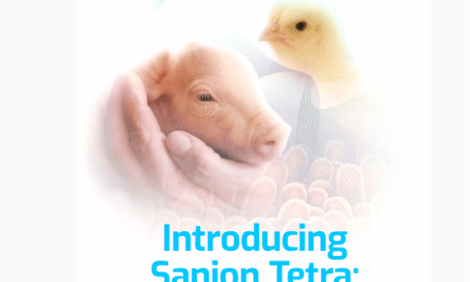



Purdue dairy speaker sinks teeth into bovine overeating
US - Overeating doesn't do a dairy cow any more good than it does a human. In fact, the negative consequences could be greater when a bovine makes a pig of itself, said Tim Johnson, Purdue University Extension dairy nutrition specialist.Dairy producers need to carefully monitor how much supplemental protein they feed their animals in order to avoid possible environmental and herd health problems, as well as higher operating costs, Johnson said. During the 2007 Tri-State Dairy Nutrition Conference, Johnson will address protein overfeeding and how it can affect a dairy operation. The conference takes place April 24-25 at the Grand Wayne Center in Fort Wayne, Ind. Johnson's presentation, "Use of Milk Urea Nitrogen in Herd Management," is slated for 5:15 p.m. on the conference's opening day. Johnson will be joined in his presentation by Herb Bucholtz, Michigan State University Extension dairy nutrition specialist.
Bovines are good at processing protein - almost too good, Johnson said. Therein lies the trouble with overfeeding such protein supplements as soybean meal, Johnson said.
"The cow is an incredibly efficient animal in utilizing nitrogen and amino acids to make milk protein," he said. "The overflow, which we might call the excess protein that a cow could consume, is excreted in two ways. One is in the urine and the other is in the milk. By monitoring milk urea nitrogen, you can determine whether you are overfeeding protein by a greater amount than is actually required for the cow to manufacture the milk protein."
Urea is an organic molecule formed from ammonia in the liver and then packaged for reabsorption from the blood into the cow's rumen or transported to the kidney for excretion. Urea resides in blood and other body fluids and is a normal component of milk. The conversion of ammonia to urea prevents ammonia toxicity in the dairy cow, which processes huge amounts of nitrogen into milk protein each day.
Producers have known that feeding supplemental protein carries both rewards and risks. With the growth of the biofuels industry, they will have to be even more aware of the proper feeding rates, Johnson said.
"With the influx of ethanol distilleries all over the state, the ethanol byproduct - dried distillers grains with solubles - is coming as a very economically efficient energy and protein source," he said. "And yet, there can be problems that are related to overfeeding dried distillers grains.
"One potential problem with feeding too much distillers grains with solubles is that the unsaturated fat - corn oil - in the solubles can inhibit some fiber digesting bacteria normally found in the rumen. This can lead to depressed milk fat, a valuable component used to make butter.
"There's also the environmental consequence of feeding too much protein through the possible contamination of waterways. The other possibly negative side effect of overfeeding protein relates to the reproduction of the dairy cow. There is some indication that there can be more loss of pregnancies in beef cattle. And in dairy cattle, the conception rate after breeding can be lower in dairy cows that have been way overfed protein."
The impact of biofuels on dairy nutrition also is the subject of a conference talk by Shawn Donkin, a Purdue dairy nutritionist. In "Feeding Glycerol from Biodiesel Production," Donkin will explain the pluses and minuses of utilizing the soybean oil extract as a dairy herd supplement.
"Shawn has been involved in a research trial where dairy cows have been fed different levels of glycerol," Johnson said. "He'll talk about how glycerol can be used, its nutritional value and the possible contaminants that could be present if it is not highly purified."
Specialists from various land-grant universities and agribusinesses will address more than a dozen other dairy nutrition topics at the conference. Topics range from biotechnology to raising calves to footbaths to manure output to organic milk production.
Conference registration is $140 per person and includes the conference proceedings, a breakfast, refreshments and a hospitality reception. Registration discounts are available for groups of 10 or more from the same company.
The registration deadline is April 5. A late fee will be added for registrations received after the deadline or at the conference.
A conference brochure with registration form is available online at http://tristatedairy.osu.edu. Additional registration information is available by contacting Michelle Milligan of Ohio State University at (614) 292-7374, [email protected] .
The Grand Wayne Center is located at 120 W. Jefferson Blvd., in downtown Fort Wayne.
Purdue, Michigan State and Ohio State universities are the conference sponsors.
TheCattleSite News Desk


